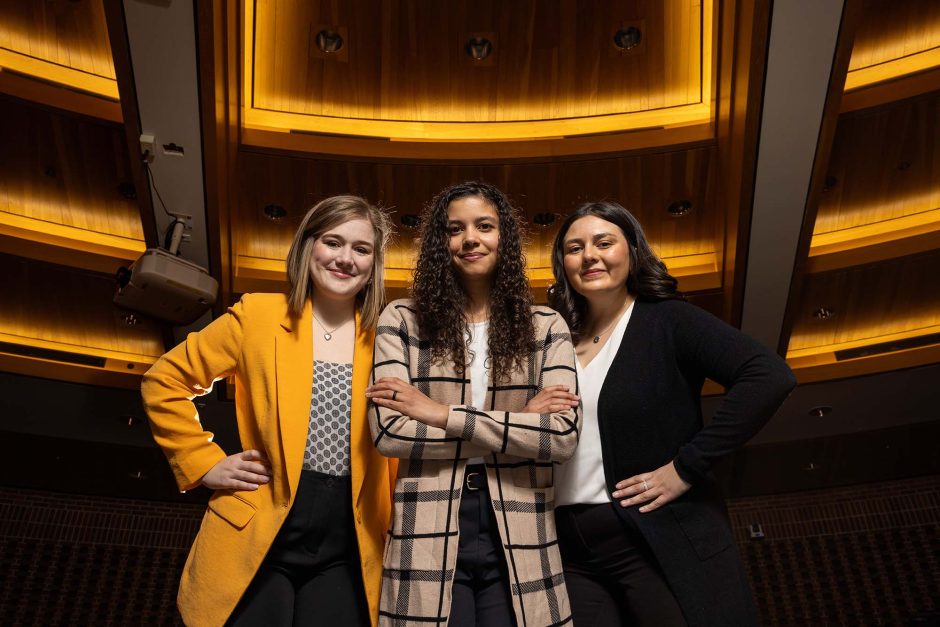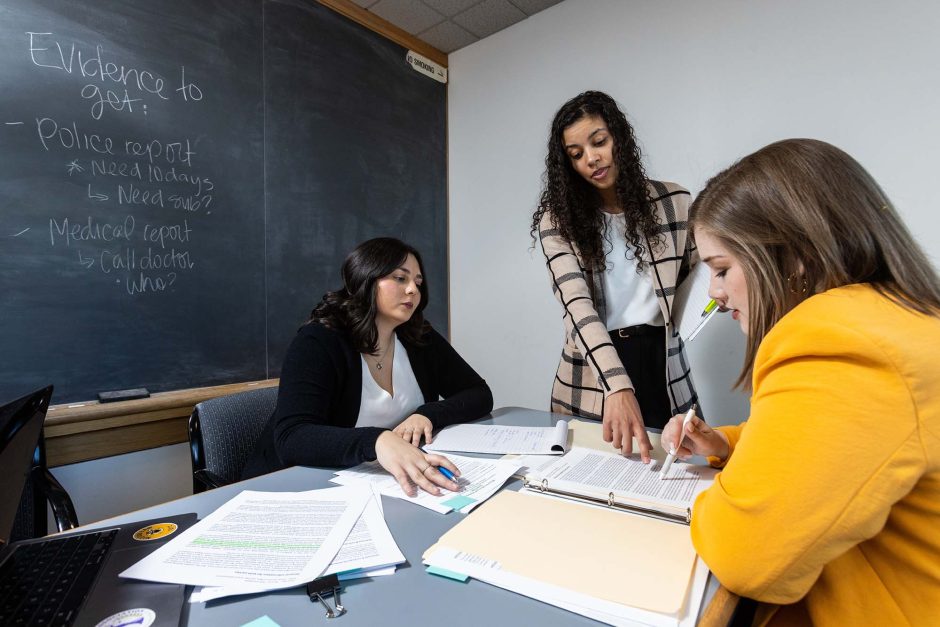
Feb. 20, 2025
Contact: Sara Diedrich, diedrichs@missouri.edu
Photos by Abbie Lankitus
When the Child and Family Justice Clinic (CFJC) reopened last year at the University of Missouri School of Law, it restored an invaluable training ground for future attorneys and a vital lifeline for families in the state. Law students once again had the opportunity to advocate for real clients, gaining hands-on experience while making a meaningful difference in the lives of others.
There has been a growing movement in legal education to expand experiential learning, and Mizzou has long recognized its undeniable value to students, Paul Litton, dean of Mizzou Law, said.
“We’re not just teaching them to be great lawyers — we’re giving them real clients and real cases, immersing them in the practice of law,” he said. “Here, they learn to represent people facing sensitive, serious legal matters while gaining hands-on experience that shapes their careers. At the same time, we’re providing crucial legal services to individuals who need help but can’t afford an attorney. It’s a powerful opportunity to learn while making a real difference."
CFJC — formerly known as the Family Violence Clinic — allows students to engage and assist in all aspects of a client’s representation, from providing advice and counseling to appearing in Boone County courts on the client’s behalf. Most semesters, student teams handle about 25 cases.
The clinic reopened last year after closing in 2020 when the founder, Professor Emerita Mary Beck, retired after 25 years.
Today, more than 430 alumni of the clinic work in various capacities across the country. The clinic has been so successful that the law school is currently working to expand its services to Audrain, Cole and Monteau counties, giving more law students opportunities to work with clients.
Hands-on advocacy
Each semester, 10 second- and third-year law students are selected to practice at the clinic. The students, who work in pairs, are Rule 13 certified, meaning they have been approved by The Missouri Bar to advise clients, draft legal documents and represent clients in court — all under the supervision of a licensed attorney. At CFJC, that supervising attorney is Director Danielle Dodd, BSW ’18, JD ’22.
The clinic provides vital support to individuals involved in Boone County court cases, helping with orders of protection, child custody matters, adoption proceedings and other family law issues, particularly those related to domestic relations. All clinic services are free, aside from court fees and costs, which are often waived. Clients access the clinic through various referral sources, including the courts, Mid-Missouri Legal Services, ParentLink and others.
When it comes to working with survivors of domestic violence, Dodd, believes in operating from an “empowerment model.”
“If a client isn’t ready to take a particular step, forcing them won’t truly help,” she said. “Instead, we provide them with the necessary information, ensuring they understand the process and their options. Ultimately, the client is the expert of their own life, and we must respect their decisions. Developing the ability to support without pressuring is a critical skill. In the end, it’s the client who must live with the outcomes of the choices we help them implement.”
That’s why active listening is at the heart of what students learn at CFJC.

Lessons learned
That philosophy resonates deeply with Erika LeFauve, a third-year law student whose early experiences in the court system were shaped by her parents’ teenage marriage and early divorce. As a result, she decided by age 12 to become an attorney and help change the system.
When LeFauve learned that CFJC had reopened, she was eager to join the clinic. Last fall, she was paired with fellow third-year law student Mariana Larson, and together, they handled cases for three clients.
LeFauve’s experience at CFJC reinforced her passion for pursuing a career in which she can provide high-quality legal services to those who otherwise couldn’t afford them.
“It has always broken my heart that so many people are unable to access legal help simply because of financial barriers,” she said. “I want to give back to these individuals by becoming an attorney who not only cares deeply about their cases but also ensures they receive competent, dedicated representation. I believe they deserve someone who will fight for them with both skill and compassion."
Larson enjoyed partnering with LeFauve and appreciated the opportunity to support real clients through impactful cases.
“I always knew I wanted to be in court, but I wasn’t sure I was capable of it,” Larson, who built confidence through the experience, said. “My time at the clinic assured me that I can do it. That was such a great part of my experience there — I learned how to communicate with clients, other attorneys and the courts.”
LeFauve said she learned that true empathy means being willing to meet people as they are, to listen without judgment and to advocate for them with sincerity.
“It requires deep self-reflection — setting aside personal biases, preconceived notions and assumptions to fully understand that people’s circumstances are uniquely their own,” she said. “To do this, you have to approach each client with an open heart while also maintaining your own boundaries.”
For LeFauve, the opportunity to work at CFJC has been deeply personal, a balance between her own story and the desire to support others in theirs.
“What I found is those things don’t have to be in conflict,” she said. “By giving our clients a voice, I have gained some of my own voice back.”
Into the future
Dodd welcomes a broad range of law students to the clinic. Whether they are drawn to family law, criminal law or corporate practice, the heart of the clinic is learning to understand, anticipate and respond to the needs of individuals who have survived trauma.
“Regardless of their chosen path, these skills make the profession stronger as a whole,” she said. “This clinic has built a powerful legacy — one I am committed to carrying forward.”



